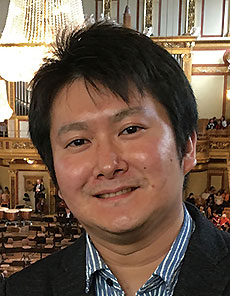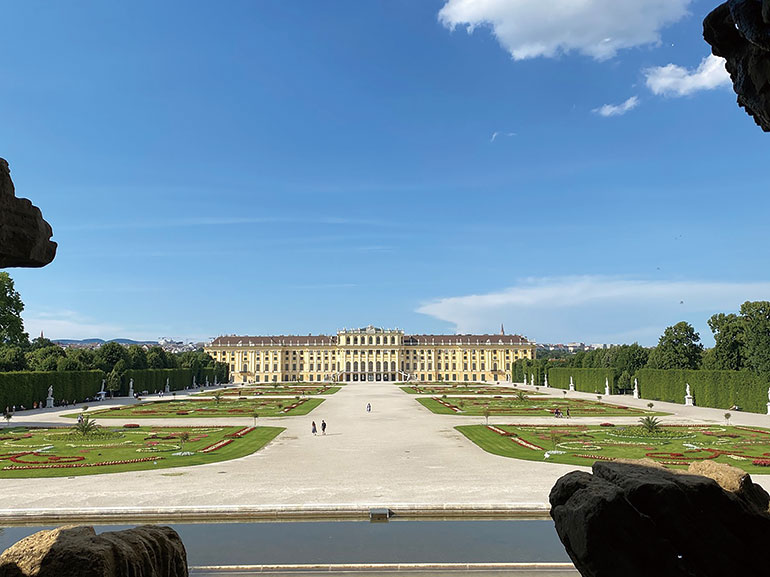Disclaimer: machine translated by DeepL which may contain errors.
Lockdown of Parasite DNA
Akinaga Koshisakabe (Project Assistant Professor, Department of Biological Sciences)

"Covid-19 is not just a flu"-was the sentence in an email I received on March 10, 2020, from Magnus Nordborg, director of the Gregor Mendel Institute in Vienna, Austria, where I was formerly affiliated. The email was from Magnus Nordborg, Director of the Gregor Mendel Institute in Vienna, Austria, to whom I was formerly affiliated, and which I received on March 10, 2020. At the time the e-mail was received, the border with neighboring Italy, where the new corona outbreak was spreading rapidly, was closed, and several cases of infection had been reported in the city. The day after this e-mail, the Austrian government announced that it was planning to implement a lockdown, which caused a great deal of confusion in the office. At first, the word "lockdown" did not ring a bell, but the day after the government announcement (probably already a few hours after the announcement), pasta and other daily necessities completely disappeared from supermarkets, and we saw the gravity of the situation. The Institute also became off-limits on March 16, the day the lockdown began, and all communication between Institute members became remote. When entering the Institute for unavoidable reasons such as plant/animal care or sampling, we were issued an official letter from the Institute to present to the police who were watching us on the street when asked (because we had to pay a fine of about 250,000 yen if we were considered to be leaving the Institute unnecessarily). One month after the lockdown was imposed, a downward trend in the number of infected persons was observed, and the curfew was relaxed accordingly. The restriction on entry to the Institute was similarly relaxed, and although there was a limit of one person per laboratory bench, we were able to resume our research activities while conducting PCR tests twice a week in the Institute.
Under these circumstances, I was just preparing my dissertation. The genomes of organisms contain mobile DNA called transposons. It is known that transposons are normally quenched by chemical modifications of DNA and histones (proteins that fold the genome) so that they do not move around in the genome. However, the molecular mechanism of how DDM1 quiets transposons has long remained unclear. In this paper, we report the discovery of a novel mechanism by which DDM1 quenches transposons via loading of specific histone variants onto chromatin (A. Osakabe et al., Nat. Cell Biol. 23, 391 (2021 )).
 A view of Schönbrunn Palace in the city of Vienna, which is registered as a World Heritage site (photo taken in June 2020). It is usually one of the most popular tourist attractions, but at the time after the first lockdown was lifted, there were no tourists at all and only a few locals stopped by for a walk.
A view of Schönbrunn Palace in the city of Vienna, which is registered as a World Heritage site (photo taken in June 2020). It is usually one of the most popular tourist attractions, but at the time after the first lockdown was lifted, there were no tourists at all and only a few locals stopped by for a walk.After submitting the manuscript of this paper to the journal, I was transferred to the University of Tokyo and returned to Japan a few days before the second lockdown started. It was in March, during the third lockdown, that I sent a revised manuscript and it was accepted. The lockdown followed every event. In preparing the manuscript for the press release with Dr. Frederick Berger ( https://www. oeaw.ac.jp), I decided to use the title "Lockdown for genome parasites" because of this background. oeaw.ac.at/gmi/detail/news/lockdown-for-genome-parasites). Lockdown may be a potential method common from molecules to people (populations).
Faculty of Science News is collecting essay manuscripts. We welcome all submissions, regardless of whether they are self-recommended or not. We especially welcome submissions from Faculty and graduate students. However, the Communications & Public Relations Committee will decide whether or not to publish your essay.
Please send your contributions to rigaku-news@adm.s.u-tokyo.ac.jp.
Published in the July 2021 issue of Faculty of Science News


